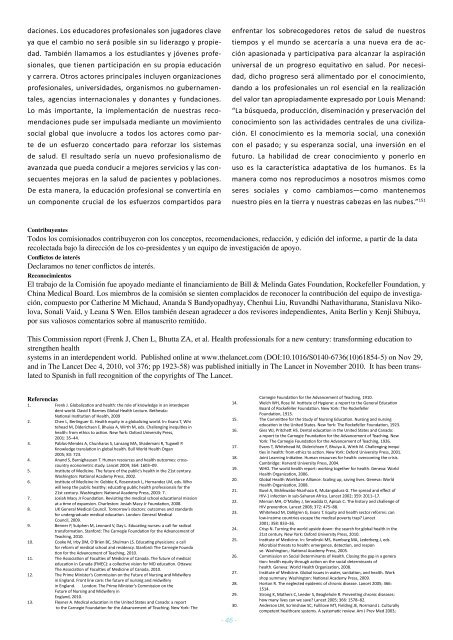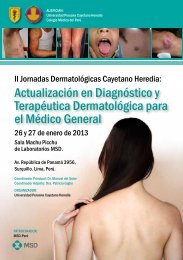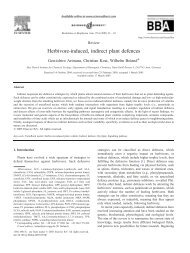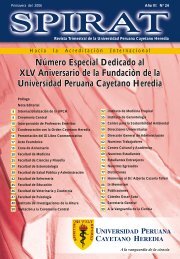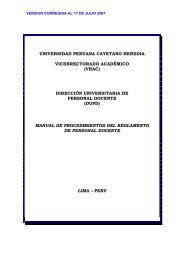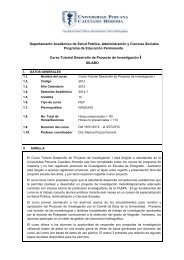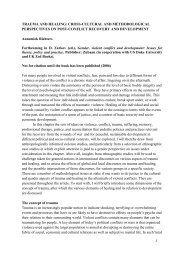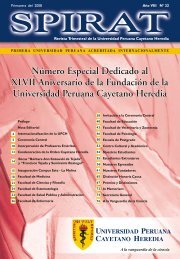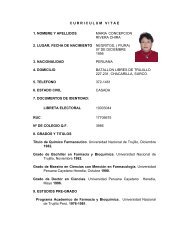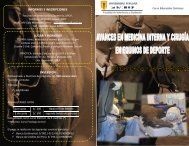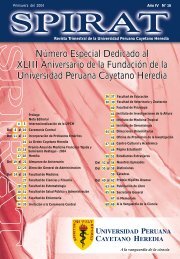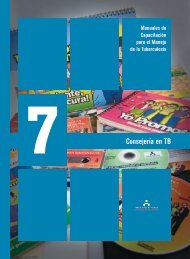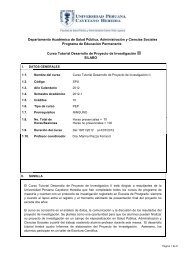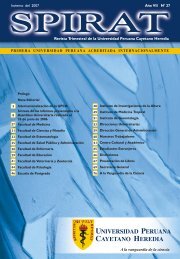daciones. Los educadores profesionales son jugadores c<strong>la</strong>veya que <strong>el</strong> cambio no será posible sin su li<strong>de</strong>razgo y propiedad.También l<strong>la</strong>mamos a los estudiantes y jóvenes profesionales,que tienen participación en su propia educacióny carrera. Otros actores principales incluyen organizacionesprofesionales, universida<strong>de</strong>s, organismos no gubernamentales,agencias internacionales y donantes y fundaciones.Lo más importante, <strong>la</strong> implementación <strong>de</strong> nuestras recomendacionespu<strong>de</strong> ser impulsada mediante un movimientosocial global que involucre a todos los actores como parte<strong>de</strong> un esfuerzo concertado <strong>para</strong> reforzar los sistemas<strong>de</strong> <strong>salud</strong>. El resultado sería un <strong>nuevo</strong> profesionalismo <strong>de</strong>avanzada que pueda conducir a mejores servicios y <strong>la</strong>s consecuentesmejoras en <strong>la</strong> <strong>salud</strong> <strong>de</strong> pacientes y pob<strong>la</strong>ciones.De esta manera, <strong>la</strong> educación profesional se convertiría enun componente crucial <strong>de</strong> los esfuerzos compartidos <strong>para</strong>enfrentar los sobrecogedores retos <strong>de</strong> <strong>salud</strong> <strong>de</strong> nuestrostiempos y <strong>el</strong> mundo se acercaría a una nueva era <strong>de</strong> acciónapasionada y participativa <strong>para</strong> alcanzar <strong>la</strong> aspiraciónuniversal <strong>de</strong> un progreso equitativo en <strong>salud</strong>. Por necesidad,dicho progreso será alimentado por <strong>el</strong> conocimiento,dando a los profesionales un rol esencial en <strong>la</strong> realización<strong>de</strong>l valor tan apropiadamente expresado por Louis Menand:“La búsqueda, producción, diseminación y preservación <strong>de</strong>lconocimiento son <strong>la</strong>s activida<strong>de</strong>s centrales <strong>de</strong> una civilización.El conocimiento es <strong>la</strong> memoria social, una conexióncon <strong>el</strong> pasado; y su esperanza social, una inversión en <strong>el</strong>futuro. La habilidad <strong>de</strong> crear conocimiento y ponerlo enuso es <strong>la</strong> característica adaptativa <strong>de</strong> los humanos. Es <strong>la</strong>manera como nos reproducimos a nosotros mismos comoseres sociales y como cambiamos—como mantenemosnuestro pies en <strong>la</strong> tierra y nuestras cabezas en <strong>la</strong>s nubes.” 151ContribuyentesTodos los comisionados contribuyeron con los conceptos, recomendaciones, redacción, y edición <strong>de</strong>l informe, a partir <strong>de</strong> <strong>la</strong> datarecolectada bajo <strong>la</strong> dirección <strong>de</strong> los co-presi<strong>de</strong>ntes y un equipo <strong>de</strong> investigación <strong>de</strong> apoyo.Conflictos <strong>de</strong> interésDec<strong>la</strong>ramos no tener conflictos <strong>de</strong> interés.ReconocimientosEl trabajo <strong>de</strong> <strong>la</strong> Comisión fue apoyado mediante <strong>el</strong> financiamiento <strong>de</strong> Bill & M<strong>el</strong>inda Gates Foundation, Rockef<strong>el</strong>ler Foundation, yChina Medical Board. Los miembros <strong>de</strong> <strong>la</strong> comisión se sienten comp<strong>la</strong>cidos <strong>de</strong> reconocer <strong>la</strong> contribución <strong>de</strong>l equipo <strong>de</strong> investigación,compuesto por Catherine M Michaud, Ananda S Bandyopadhyay, Chenhui Liu, Ruvandhi Nathavitharana, Stanis<strong>la</strong>va Nikolova,Sonali Vaid, y Leana S Wen. Ellos también <strong>de</strong>sean agra<strong>de</strong>cer a dos revisores in<strong>de</strong>pendientes, Anita Berlin y Kenji Shibuya,por sus valiosos comentarios sobre al manuscrito remitido.This Commission report (Frenk J, Chen L, Bhutta ZA, et al. Health professionals for a new century: transforming education tostrengthen healthsystems in an inter<strong>de</strong>pen<strong>de</strong>nt world. Published online at www.the<strong>la</strong>ncet.com (DOI:10.1016/S0140-6736(10)61854-5) on Nov 29,and in The Lancet Dec 4, 2010, vol 376; pp 1923-58) was published initially in The Lancet in November 2010. It has been trans<strong>la</strong>tedto Spanish in full recognition of the copyrights of The Lancet.Referencias1. Frenk J. Globalization and health: the role of knowledge in an inter<strong>de</strong>pen<strong>de</strong>nt world. David E Barmes Global Health Lecture. Bethesda:National Institution of Health, 20092. Chen L, Berlinguer G. Health equity in a globalizing world. In: Evans T, Whitehead M, Di<strong>de</strong>richsen F, Bhuiya A, Wirth M, eds. Challenging inequities inhealth: from ethics to action. New York: Oxford University Press,2001: 35–44.3. Pablos-Men<strong>de</strong>z A, Chunharas S, Lansang MA, Sha<strong>de</strong>mani R, Tugw<strong>el</strong>l P.Knowledge trans<strong>la</strong>tion in global health. Bull World Health Organ2005; 83: 723.4. Anand S, Barnighausen T. Human resources and health outcomes: crosscountryeconometric study. Lancet 2004; 364: 1603–09.5. Institute of Medicine. The future of the public’s health in the 21st century.Washington: National Aca<strong>de</strong>my Press, 2002.6. Institute of Medicine In: Gebbie K, Rosenstock L, Hernan<strong>de</strong>z LM, eds. Whowill keep the public healthy: educating public health professionals for the21st century. Washington: National Aca<strong>de</strong>my Press, 2003: 7.7. Josiah Macy Jr Foundation. Revisiting the medical school educational missionat a time of expansion. Charleston: Josiah Macy Jr Foundation, 2008.8. UK General Medical Council. Tomorrow’s doctors: outcomes and standardsfor un<strong>de</strong>rgraduate medical education. London: General MedicalCouncil, 2009.9. Benner P, Sutphen M, Leonard V, Day L. Educating nurses: a call for radicaltransformation. Stanford: The Carnegie Foundation for the Advancement ofTeaching, 2010.10. Cooke M, Irby DM, O’Brien BC, Shulman LS. Educating physicians: a callfor reform of medical school and resi<strong>de</strong>ncy. Stanford: The Carnegie Foundation for the Advancement of Teaching, 2010.11. The Association of Faculties of Medicine of Canada. The future of medicaleducation in Canada (FMEC): a collective vision for MD education. Ottawa:The Association of Faculties of Medicine of Canada, 2010.12. The Prime Minister’s Commission on the Future of Nursing and Midwiferyin Eng<strong>la</strong>nd. Front line care: the future of nursing and midwiferyin Eng<strong>la</strong>nd. London: The Prime Minister’s Commission on theFuture of Nursing and Midwifery inEng<strong>la</strong>nd, 2010.13. Flexner A. Medical education in the United States and Canada: a reportto the Carnegie Foundation for the Advancement of Teaching. New York: The- 46 -Carnegie Foundation for the Advancement of Teaching, 1910.14. W<strong>el</strong>ch WH, Rose W. Institute of Hygiene: a report to the General EducationBoard of Rockef<strong>el</strong>ler Foundation. New York: The Rockef<strong>el</strong>lerFoundation, 1915.15. The Committee for the Study of Nursing Education. Nursing and nursingeducation in the United States. New York: The Rockef<strong>el</strong>ler Foundation, 1923.16. Gies WJ, Pritchett HS. Dental education in the United States and Canada:a report to the Carnegie Foundation for the Advancement of Teaching. NewYork: The Carnegie Foundation for the Advancement of Teaching, 1926.17. Evans T, Whitehead M, Di<strong>de</strong>richsen F, Bhuiya A, Wirth M. Challenging inequities in health: from ethics to action. New York: Oxford University Press, 2001.18. Joint Learning Initiative. Human resources for health: overcoming the crisis.Cambridge: Harvard University Press, 2004.19. WHO. The world health report: working together for health. Geneva: WorldHealth Organization, 2006.20. Global Health Workforce Alliance. Scaling up, saving lives. Geneva: WorldHealth Organization, 2008.21. Buvé A, Bishikwabo-Nsarhaza K, Mutangadura G. The spread and effect ofHIV-1 infection in sub-Saharan Africa. Lancet 2002; 359: 2011–17.22. Merson MH, O’Malley J, Serwadda D, Apisuk C. The history and challenge ofHIV prevention. Lancet 2008; 372: 475–88.23. Whitehead M, Dahlgren G, Evans T. Equity and health sector reforms: canlow-income countries escape the medical poverty trap? Lancet2001; 358: 833–36.24. Crisp N. Turning the world upsi<strong>de</strong> down: the search for global health in the21st century. New York: Oxford University Press, 2010.25. Institute of Medicine. In: Smolinski MS, Hamburg MA, Le<strong>de</strong>rberg J, eds.Microbial threats to health: emergence, <strong>de</strong>tection, and response. Washington,: National Aca<strong>de</strong>my Press, 2005.26. Commission on Social Determinants of Health. Closing the gap in a generation: health equity through action on the social <strong>de</strong>terminants ofhealth. Geneva: World Health Organization, 2008.27. Institute of Medicine. Global issues in water, sanitation, and health. Workshop summary. Washington: National Aca<strong>de</strong>my Press, 2009.28. Horton R. The neglected epi<strong>de</strong>mic of chronic disease. Lancet 2005; 366:1514.29. Strong K, Mathers C, Lee<strong>de</strong>r S, Beaglehole R. Preventing chronic diseases:how many lives can we save? Lancet 2005; 366: 1578–82.30. An<strong>de</strong>rson LM, Scrimshaw SC, Fullilove MT, Fi<strong>el</strong>ding JE, Normand J. Culturallycompetent healthcare systems. A systematic review. Am J Prev Med 2003;
24: 68–79.31. Yach D, Lee<strong>de</strong>r SR, B<strong>el</strong>l J, Kistnasamy B. Global chronic diseases. Science2005; 307: 317.32. Chen LC. Striking the right ba<strong>la</strong>nce: health workforce retention in remoteand rural areas. Bull World Health Organ 2010; 88: 323A.33. WHO. Increasing access to health workers in remote and rural areas throughimproved retention. Geneva: World Health Organization, 2010. http://www.who.int/hrh/retention/gui<strong>de</strong>lines/ en/in<strong>de</strong>x.html (accessed Aug 12, 2010).34. Chen L, Evans T, Anand S, et al. Human resources for health: overcoming thecrisis. Lancet 2004; 364: 1984–90.35. Amin Z, Burdick WP, Supe A, Singh T. R<strong>el</strong>evance of the Flexner Report tocontemporary medical education in South Asia. Acad Med 2010; 85: 333–39.36. Naylor CD. Lea<strong>de</strong>rship in aca<strong>de</strong>mic medicine: reflections from administrativeexile. Clin Med 2006; 6: 488–92.37. Siantz ML, M<strong>el</strong>eis AI. Integrating cultural competence into nursing educationand practice: 21st century action steps. J Transcult Nurs 2007; 18: 86S–90S.38. Public Health Foundation of India. Report of the international conference onnew directions for public health education in low and middleincome countries. Hy<strong>de</strong>rabad: Public Health Foundation of India, 2008.39. Merson M, Schulman K. Health systems strengthening through humanresources and capacity building: a <strong>la</strong>ndscaping study on thesupply of health systems management, policy, and financing training programs and the <strong>de</strong>mand for healthsystems experts. Nairobi: The Landscaping for Health Systems StrengtheningInitiative (LHSSI), 2009.40. Ke Y, Sun BZ. Challenges in China’s health professional education. Presentation at the second meeting of the Commission on Education ofHealth Professionals for the 21st Century. Peking University, Beijing, China;April 26, 2010.41. Lu C, Schnei<strong>de</strong>r MT, Gubbins P, Leach-Kemon K, Jamison D, Murray CJL.Public financing of health in <strong>de</strong>v<strong>el</strong>oping countries: a cross-national systematic analysis. Lancet 2010; 375: 1375–87.42. Bhutta Z, Lassi Z, Pariyo G, Huicho L. Global experience of community healthworkers for <strong>de</strong>livery of health re<strong>la</strong>ted Millennium Dev<strong>el</strong>opment Goals: a systematic review, country case studies, and recommendations forintegration into national health systems. Geneva: Global HealthWorkforce Alliance, 2010. http:// www.who.int/workforcealliance/knowledge/resources/chwreport/ en/in<strong>de</strong>x.html (accessed Oct 29, 2010).43. Royal College of Physicians. Doctors in society: medical professionalism in achanging world. London: Royal College of Physicians, 2005.44. Swick HM. Toward a normative <strong>de</strong>finition of medical professionalism. AcadMed 2000; 75: 612–16.45. Medical professionalism in the new millennium: a physician charter. J AmColl Surg 2003; 196: 115–18.46. Cohen JJ, Cruess S, Davidson C. Alliance between society and medicine: thepublic’s stake in medical professionalism. JAMA 2007; 298: 670–73.47. Levinson W, Lesser CS, Epstein RM. Dev<strong>el</strong>oping physician communicationskills for patient-centered care. Health Aff (Millwood) 2010; 29: 1310–18.48. Garcia PJ, Curioso WH, Lazo-Esca<strong>la</strong>nte M, Gilman RH, Gotuzzo E. Globalhealth training is not only a <strong>de</strong>v<strong>el</strong>oped-country duty. J Public Health Policy2009; 30: 250–52.49. OECD. Policy brief: E-learning in tertiary education. Paris: OECD, 2005. http://www.cumex.org.mx/archivos/ACERVO/ ElearningPolicybriefenglish.pdf(accessed Aug 12, 2010).50. Frenk J, Durán-Arenas L. The medical profession and the State. In: HaffertyFW, McKin<strong>la</strong>y JB, eds. The changing medical profession: an internationalperspective. New York: Oxford University Press, 1993: 25–42.51. Murray C, Frenk J. A framework for assessing the performance of healthsystems. Bull World Health Organ 2000; 78: 717–31.52. Azizi F. The reform of medical education in Iran. Med Educ 1997; 31: 159–62.53. Kent A, <strong>de</strong> Villiers MR. Medical education in South Africa-exciting times. MedTeach 2007; 29: 906–09.54. Kurdak H, Altintas D, Doran F. Medical education in Turkey: past to future.Med Teach 2008; 30: 768–73.55. Lam TP, Lam YY. Medical education reform: the Asian experience Acad Med2009; 84: 1313–17.56. Filliozat J. The c<strong>la</strong>ssical doctrine of Indian medicine. D<strong>el</strong>hi: Munshiram Manohar<strong>la</strong>l, 1964.57. Zhu Y-P. Chinese materia medica: chemistry, pharmacology, and applications.Amsterdam: Harwood Aca<strong>de</strong>mic Publishers, 1998.58. Bonner TN. Becoming a physician: medical education in Britain, France,Germany, and the United States 1750–1945. New York:OxfordUniversity Press, 1996.59. Porter R. The greatest benefit to mankind: a medical history of humanity.New York: W W Norton & Company, 1997.60. Irvine D. A short history of the General Medical Council. Med Educ 2006; 40:202–11.61. Nightingale F. Notes on Nursing. What it is, and what it is not (1st Americanedn). New York: D Appleton and Company, 1860.62. Bostridge M. Florence Nightingale: the making of an icon. New York: Farrar,Straus and Giroux, 2008.63. Flexner A. Medical education in Europe: a report to the Carnegie Foundationfor the Advancement of Teaching. New York: Carnegie Foundation for theAdvancement of Teaching, 1912.64. Fosdick R. The story of the Rockef<strong>el</strong>ler Foundation. New York: Harper & Bros,1952.65. Bullock MB. An American transp<strong>la</strong>nt: the Rockef<strong>el</strong>ler Foundation and thePeking Union Medical College Berkley: University of California Press, 1980.66. W<strong>el</strong>lman C. The New Orleans School of Tropical Medicine and Hygiene. NewOrleans Med Surg J 1912; 64: 893–915.67. Frenk J, Sepúlveda J, Gómez-Dantés O, Knaul F. Evi<strong>de</strong>nce-based healthpolicy: three generations of reform in Mexico. Lancet 2003; 362: 1667–71.68. Horton R. The occupied Palestinian territory: peace, justice, and health.Lancet 2009; 373: 784–88.69. Frenk J, Gonzalez-Block MA. Institutional <strong>de</strong>v<strong>el</strong>opment for public health:learning the lessons, renewing the commitment. J Public Health Policy 2008;29: 449–58.70. Chen LC. Phi<strong>la</strong>nthropic partnership for public health in India? Lancet 2006;367: 1800–01.71. Rosenberg CE. Our present comp<strong>la</strong>int: American medicine, then and now.Baltimore: Johns Hopkins University Press, 2007.72. Whitcomb ME. Commentary: Flexner Redux 2010: graduate medical education in the United States. Acad Med 2009; 84: 1476–78.73. Neville AJ. Problem-based learning and medical education forty years on. Areview of its effects on knowledge and clinical performance. Med Princ Pract2009; 18: 1–9.74. Papa FJ, Harasym PH. Medical curriculum reform in North America, 1765 to- 47 -the present: a cognitive science perspective. Acad Med 1999; 74: 154–64.75. Pickering G. Quest for exc<strong>el</strong>lence in medical education: a personal survey.Oxford: Oxford University Press, 1978.76. Har<strong>de</strong>n RM. What is an OSCE? Med Teach 1988; 10: 19–22.77. Luban-Plozza B. Empowerment techniques: from doctor-centered (Balintapproach) to patient-centred discussion groups. Patient Educ Couns 1995;26: 257–63.78. Seipp C. Health care for the community. Baltimore: Johns Hopkins UniversityPress, 1963.79. Wyon JB, Gordon JE. The Khanna study: popu<strong>la</strong>tion problems in the ruralPunjab. Cambridge: Harvard University Press, 1971.80. Kark S. The practice of community oriented primary health care. New York:Appleton-Century-Crofts, 1981.81. Chen CC, Bunge FM. Medicine in rural China. Berk<strong>el</strong>ey: University of California Press, 1989.82. Institute of Medicine. The future of nursing: leading change, advancinghealth. October, 2010. http://www.iom.edu/Reports/2010/The-Future-of-Nursing-Leading-Change-Advancing-Health.aspx (accessed Oct 20, 2010).83. Upvall MJ, Karmaliani R, Pirani F, Gul R, Khalid F. Dev<strong>el</strong>oping nursing lea<strong>de</strong>rsthrough graduate education in Pakistan. Int J Nurs Educ Scho<strong>la</strong>rsh 2004; 1:article 27.84. American Association of Colleges of Nursing. The essentials of Master’seducation for advanced practice nursing. Washington: American Associationof Colleges of Nursing, 1996.85. Association of American Medical Colleges. A snapshot of medical stu<strong>de</strong>nteducation in the United States and Canada. Acad Med 2010; 85: S1–648.86. Eckhert NL. Perspective: private schools of the Caribbean: outsourcing medical education. Acad Med 2010; 85: 622–30.87. Shomaker TS. For-profit un<strong>de</strong>rgraduate medical education: back to thefuture? Acad Med 2010; 85: 363–69.88. Xu D, Sun B, Wan X, Ke Y. Reformation of medical education in China. Lancet2010; 375: 1502–04.89. Anand S, Fan VY, Zhang J, et al. China’s human resources for health: quantity,quality, and distribution. Lancet 2008; 372: 1774–81.90. Mul<strong>la</strong>n F. The metrics of the physician brain drain. N Engl J Med 2005; 353:1810–18.91. Kline DS. Push and pull factors in international nurse migration. J Nurs Scho<strong>la</strong>rsh 2003; 35: 107–11.92. Aiken LH, Buchan J, Sochalski J, Nichols B, Pow<strong>el</strong>l M. Trends in internationalnurse migration. Health Aff (Millwood) 2004; 23: 69–77.93. Bach S. International migration of health workers: Labour and social issues.Geneva: International Labour Office, 2007. http://www.hrhresourcecenter.org/no<strong>de</strong>/154 (accessed Aug 12, 2010).94. Valberg LS, Gonyea MA, Sinc<strong>la</strong>ir DG, Wa<strong>de</strong> J. P<strong>la</strong>nning the future aca<strong>de</strong>micmedical centre. CMAJ 1994; 151: 1581–87.95. Keehan S, Sisko A, Truffer C, et al. Health spending projections through2017: the baby-boom generation is coming to Medicare. HealthAff (Millwood) 2008; 27: w145–55.96. Institute of Medicine. Integrative medicine and the health of the public: asummary of the February 2009 summit. Washington: NationalAca<strong>de</strong>my Press, 2009.97. John E Fogarty International Center. Medical Education Partnership Initiative(MEPI), U.S. National Institutes of Health. June, 2010. http://www.fic.nih.gov/programs/training_grants/mepi/ (accessed Aug 12, 2010).98. Institute of Medicine. In: Sepulveda J, Carpenter C, Curran J, et al. PEPFARimplementation: progress and promise. Washington: NationalAca<strong>de</strong>my Press, 2007.99. Kwong JC, Dhal<strong>la</strong> IA, Streiner DL, Baddour RE, Wad<strong>de</strong>ll AE, Johnson IL. Effectsof rising tuition fees on medical school c<strong>la</strong>ss composition and financialoutlook. CMAJ 2002; 166: 1023–28.100. United States Government Accountability Office. Graduate medical education: trends in training and stu<strong>de</strong>nt <strong>de</strong>bt. Washington DC; May, 2009. http://www.gao.gov/new.items/d09438r.pdf (accessed Oct 20, 2010).101. Hauer KE, Durning SJ, Kernan WN, Fagan MJ, Mintz M, O’Sullivan PS, et al.Factors associated with medical stu<strong>de</strong>nts’ career choices regarding internalmedicine. JAMA 2008; 300: 1154–64.102. Ghuman BS. Corruption in education: time to tame the regu<strong>la</strong>tors. The Tribune (Chandigarh), May 25, 2010. http://www.tribuneindia.com/2010/20100525/edit.htm#6 (accessed Aug 12, 2010).103. Chatterjee P. Trouble at the Medical Council of India. Lancet 2010; 375: 1679.104. Maseeh J. Magnitu<strong>de</strong> of corruption in Medical Council of India unimaginable. Media ScanJune 4, 2010. http://mediascanenglish.blogspot.com/2010/06/magnitu<strong>de</strong>-of-corruptionin-medical.html(accessed Aug 8, 2010)105. Wool<strong>la</strong>rd RF. Social accountability and accreditation in the future of medical education.Commission paper 2010. http://www.globalcommehp.com/ (accessed Oct 29, 2010).106. WHO. The world health report: working together for health. Geneva: World Health Organization, 2006: 46.107. WHO/WFME strategic partnership to improve medical education. Report of a technicalmeeting Schæffergår<strong>de</strong>n, Copenhagen, Denmark. 2004. http://www.who.int/hrh/links/partnership/en/ in<strong>de</strong>x.html (accessed Aug 12, 2010).108. Sub-Saharan African Medical Schools Study (SSAMS). http://www.samss.org (accessedAug 12, 2010).109. WHO, Division of Dev<strong>el</strong>opment of Human Resources for Health.Defining and measuringthe social accountability of medical schools. Geneva: World Health Organization, 1995.110. K<strong>el</strong>ler H. In behalf of the IWW. Liberator 1918: 13.111. Bo<strong>el</strong>en C, Wool<strong>la</strong>rd B. Social accountability and accreditation: a new frontier for educational institutions. Med Educ 2009; 43: 887–94.112. Wool<strong>la</strong>rd RF. Caring for a common future: medical schools’ social accountability. MedEduc 2006; 40: 301–13.113. Pálsdóttir B, Neusy A-J. Transforming medical education: lessons learned from THEnet.Commission paper 2010. http://www.globalcommehp.com/ (accessed Oct 29, 2010).114. Lionis C, Symvou<strong>la</strong>kis EK, Vardavas CI. Implementing family practice research in countrieswith limited resources: a stepwise mo<strong>de</strong>l experienced in Crete, Greece. Fam Pract 27:48–54.115. WTO. Health and social services. Geneva: World Tra<strong>de</strong> Organization, 2010. http://www.wto.org/english/tratop_e/serv_e/health_social_e/health_social_e.htm (accessed Aug 12,2010).116. Chanda R. Tra<strong>de</strong> in health services. Bull World Health Organ 2002; 80: 158–63.117. Jarman H, Greer S. Crossbor<strong>de</strong>r tra<strong>de</strong> in health services: lessons from the European<strong>la</strong>boratory. Health Policy 2009; 94: 158–63.118. WHO. WHO global co<strong>de</strong> of practice on the international recruitment of health personn<strong>el</strong>Geneva: World Health Organization, 2010. http://www.who.int/hrh/migration/co<strong>de</strong>/practice/en/in<strong>de</strong>x.html (accessed Aug 12, 2010).119. International Institute for Medical Education. Global minimum standards. http://www.iime.org/gmer.htm (accessed Aug 12, 2010).120. Institute of Medicine. Health professions education: a bridge to quality. Washington:National Aca<strong>de</strong>my Press, 2003.


